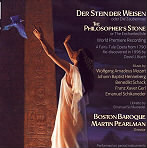The re-discovery, two years ago, by the American musicologist David J. Buch of a lost opera partly composed by Mozart came as a sensation. Actually, The Philosopher’s Stone (1790) includes very little new music by Wolfgang Amadeus. More interesting, however, is his participation in this collective work along with the future crew of his own Magic Flute: singers (Benedikt Schak was to be the first Tamino, Franz Xaver Gerl the first Sarastro), conductor (Johann Henneberg), and of course the impresario and librettist of both operas, Emanuel Schikaneder. As conductor Martin Pearlman writes, “It is fascinating to have a picture of him (Mozart) working in collaboration with a circle of composer friends to put alongside our usual image of the genius working in isolation.” Despite such disparate origins, the music isn’t bad at all. If the opera never reaches the heights of inspiration, it’s always pleasant and entertaining in the typical, light-hearted Singspiel style later sublimated in The Magic Flute. The name of Mozart comes only at the end of the Second Act, with a previously known duet and parts of the finale. These are fine moments, although you’d be hard-pressed to guess the identity of the composer just by listening to the music. This world premiere comes on period instruments, with a perfectly idiomatic cast. The voices are young and well trained, the Boston Baroque is ideally colored and disciplined, and Pearlman’s direction is as vivacious as one could hope. Telarc’s recording combines clarity and truthfulness. A worthwhile addition to the catalog.
































